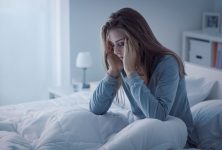
Poor Sleep May Be The Fuel For A Mental Health Crisis
One of the most under-appreciated aspects of health is getting high-quality sleep. Lack of sleep and issues with our internal body clocks not only trigger, but exacerbate psychiatric problems, according to a new study.
“Sleep-circadian disturbances are the rule, rather than the exception, across every category of psychiatric disorders,” says Dr. Sarah Chellappa from the University of Southampton, senior author of the review, in a media release. “Sleep disturbances, such as insomnia, are well understood in the development and maintenance of psychiatric disorders, but our understanding of circadian disturbances lags behind.”
“It is important to understand how these factors interact so we can develop and apply sleep-circadian interventions that benefit the sleep and mental health symptoms of patients.”
A group of researchers from the University of Southampton, Kings College London, Stanford University, and other institutions examined evidence on sleep and circadian rhythms with an emphasis on adolescents and young adults with psychiatric disorders. During these formative years, people are most at risk for developing mental health disorders, especially when sleep and circadian rhythm is disrupted.
Natural Blaze is Google-Free — We Need Your Support
Contribute Just $1 Per Month at Patreon to Aid the Cause of Health Freedom
So far, studies show that insomnia is more common in people with mental health disorders. Nearly a quarter to a third of people with mood disorders have both insomnia and hypersomnia, which describes when patients have a difficult time sleeping at night but are sleepier during the day.
Interestingly, the few studies looking at circadian rhythm sleep-wake disorders (CRSWD) suggest that 32 percent of patients with bipolar disorder fall asleep and wake up later than usual, which is called Delayed Sleep-Wake Phase Disorder. Cortisol patterns (the body’s main stress hormone) have been reported to run seven hours ahead during manic episodes and then lag four to five hours behind during depressive phases. Successful treatment means that timing is balanced again.
The team explored possible mechanisms behind sleep-circadian disturbances in psychiatric disorders. During adolescent years, physiological changes in sleep schedules go together with behavior changes like staying up longer, sleeping less on school nights, and more on the weekends.
“This variability in the duration and timing of sleep can lead to a misalignment between our body clock and our sleep-wake rhythms can increase the risk of sleep disturbances and adverse mental health outcomes,” says Dr Nicholas Meyer, from King’s College London, who co-led the review.
The researchers also examined at the role of genes, light exposure, and neural plasticity (how flexible the brain is during growth and change). Those genetically predisposed to a reduced change in activity levels between rest and wake phases are more likely to experience depression, unstable mood, and neuroticism. Population-level surveys revealed that self-reported time outdoors was associated with a decreased probability of mood disorder. Additionally, sleep is believed to play a significant role in how the brain forms new neural connections and processes emotions.
“Targeting sleep and circadian risk factors presents the opportunity to develop new preventative measures and therapies. Some of these are population-level considerations, such as the timing of school and work days, or changes in the built environment to optimize light exposure. Others are personalized interventions tailored to individual circadian parameters,” says Dr. Renske Lok from Stanford University, the co-leader of the review.
Cognitive Behavioral Therapy for Insomnia (CBT-I) has exhibited benefits for anxiety reduction, depressive symptoms, and even trauma symptoms in people experiencing post-traumatic stress disorder (PTSD). Additionally, in both major bipolar depression, light therapy in the morning on waking was effective compared to a placebo. In combination with medication, it was also shown to be more effective than using medication by itself.
Additionally, medication timing, meals, and exercise could also impact circadian phases. Melatonin in the evening may help people with Delayed Sleep-Wake Phase Disorder have a more normal sleep pattern and may benefit people with multiple psychiatric disorders. Nightshift work can negatively impact mental health but eating during the day rather than during the night could help with this, according to research suggesting that daytime eating prevents mood issues.
The review also sheds light on innovative multicomponent interventions like Transdiagnostic Intervention for Sleep and Circadian dysfunction (Trans-C). The intervention combines things that address different parts of sleep and circadian rhythms into a sleep health framework that applies to various mental health disorders.
“Collectively, research into mental health is poised to take advantage of extraordinary advances in sleep and circadian science and translate these into improved understanding and treatment of psychiatric disorders,” says Dr. Chellappa.
The findings are published in the Proceedings of the National Academy.
You might also be interested in:
Source: Study Finds
Shyla Cadogan is a DMV-Based acute care Registered Dietitian. She holds specialized interests in integrative nutrition, metabolic dysfunction, and gastrointestinal disease.
Image: Collective-Evolution






